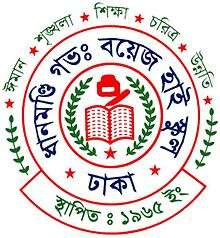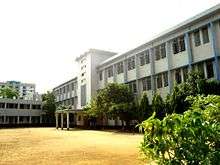Dhanmondi Government Boys' High School
| Dhanmondi Govt. Boys' High School ধানমণ্ডি গভঃ বয়েজ হাই স্কুল, ঢাকা | |
|---|---|
 ★ Trust ★ Discipline ★ Education ★ Character ★ Prosperity ★
(★ ঈমান ★ শৃঙ্খলা ★ শিক্ষা ★ চরিত্র ★ উন্নতি ★) | |
| Address | |
|
Mirpur Road Dhaka Bangladesh | |
| Information | |
| Type | Public boys' school |
| Established | 21 March 1965 |
| Founder | Syed Jafor Abbas Rizvi |
| Headmaster | Md. Insan ALi |
| Teaching staff | 57 |
| Grades | 1–10 |
| Gender | Male |
| Age range | 6-16 |
| Number of students | More than 2200 (as of 2011–2012) |
| Medium of language | Bengali |
| Campus | Urban |
| Campus size | 20 Acre |
| Color(s) | White and Navy blue |
| Athletics | DGBHS |
| Sports |
Football Cricket Basketball Volleyball Table Tennis Hockey Badminton |
| Accreditation | Board of Intermediate and Secondary Education, Dhaka |
| Yearbook | Ankur |
| Alumni | DExSA |
Dhanmondi Government Boys' High School (DGBHS) is a public boys' school located in Dhanmondi, Dhaka, Bangladesh. It is a state run educational institution located at the intersection of Mirpur Road and Manik Miah Avenue. It's EIIN: 107960.
History
The school was established in 1965 in then East Pakistan now Bangladesh and follows the SSC curriculum in Bengali medium.
Structure

The school enrolls students from class (grade) 1 to 10. The school operates in two shifts : morning and day. In morning shift, there exists one section from class 1-class 5 and two sections from class 6-class 10. In day shift, there are three sections from class 6-class 10. There is no opportunity to study in day shift from class 1 to class 5. Each section has average 60 students. Every year about 300 students appear in the SSC, JSC and PEC ( PRIMARY EDUCATION COMPLETION ) examination, with about three-fourth in science group, and the rest in commerce group.
Admission
Under the control of ‘Directorate General of Secondary and Higher Education, Dhaka’ admission lottery of all the government schools of Dhaka city are taken. There is no intense competition in the admission process of class 1. But in other classes one has to participate in 'admission test' for the chance of admission to this school. Usually students are admitted in class 1,6 and 9. Admission can be considered in other classes if vacancy is created. The admission test is taken usually in December after the 'Annual exam' ( also called yearly exam) of the school.
Daily Assembly
In order to create disciplined mind and obedience, assembly is called every day before schooling. Students telawaat Sura Fatiha, oath and sing national song of Bangladesh. Thus patriotism and moralities are grown in students' minds.
Uniform
From classes 1 to 3 the school uniform is white shirt with navy blue shorts, white shoes and navy blue sweater (for winter only). From the classes 4 to 10 the uniform is white shirt with full-length navy blue pants, white shoes and navy blue sweater (for winter only). The school's monogram is printed on the shirt's pocket.
Class and section system
When the schools was first planned it was envisaged that study would start from class 6 to class 10. During this time classes 1 to 5 were omitted, but were added in 1991.In every class have 3 sections.
Exam System & Result
There are two terms in a year. First one is 'Half-yearly' term (January - June) another one is 'Annual' term (July - December) . Students get their results digitally printed. The final result is announced taking 50% numbers from 'Half-yearly' term and 50% number from 'Annual' Term. [ Exception for class 5, 8 and 10. In case of these classes students sits for 'Test exam' instead of 'Annual exam' ]
Teachers-guardians conference
To make each students best from better, a conference is called where they discuss the problems of a student and how to remove those. Thus this school makes a good results in SSC, JSC and PEC
Library
The library has ancient and modern books which are not easily found everywhere. Most of them were bought by coeval sanctioned money during the establishment of the school. Others were bought by annually approved money. For the reason of Enam Committee the post 'librarian' was discontinued but now it is running under a teacher of this school.
School Magazine
The name of the magazine of the school is ANKUR. The magazine is not published regularly every year. It was last published in 2013. The school magazine is a historical document of the growth of the school. It informs the future generation of students about the traditions built up of their school. This valuable publication is the opportunity that students require to show their creative talents. Along with academic studies, students are encouraged in games and athletics, art and craft, science clubs, dramatics and various other activities. These make the years in school interesting and worth remembering. But intellectual activities like debates, elocution and essay-writing competitions are rarely found. The school magazine is the window to the activities of the school. Proper initiative by the teachers can help in improving the views and expressions of the students which in turn will raise the standard of the magazine.
Students' Association
The former students of DGBHS are known as DExSA (sometimes referred to Dboys), a phrase which was initially proposed by Dboys' Ex-Students Association (DExSA) just before its wider acceptance. DExSA, however, is the alumni association of the institution.
Extracurricular Sports
The students of DGBHS are active in sports. The annual sports competition is organized by the school authority in February each year. Sprints (100 to 400 meters), long jump, and high jump are few to mention among different kinds of sports in which students participate.
Clubs and Societies
- Dhanmondi Govt Boys Debating Society (DGBDS)
- Dhanmondi Govt. Boys' High School Scouts Group (DGBHSSG)
- Bangladesh National Cadet Corps (BNCC)
- Bangladesh Red Crescent Society
- Dhanmondi Boys' Photography Club (DBPC)
- Science club of Dboys (SCD)
SSC Results
| Year | Total Examinees | Pass | Percentage | GPA-5 |
|---|---|---|---|---|
| 2003 | 259 | 252 | 97.29% | 51 |
| 2005 | 268 | 266 | 99.25% | 123 |
| 2006 | 260 | 260 | 100% | 123 |
| 2007 | 265 | 265 | 100% | 149 |
| 2008 | 289 | 289 | 100% | 213 |
| 2009 | 292 | 287 | 98.28% | 167 |
| 2010 | 283 | 282 | 99.65% | 180 |
| 2011 | 322 | 322 | 100% | 218 |
| 2012 | 299 | 299 | 100% | 208 |
| 2013 | 299 | 297 | 99.35% | 181 |
| 2014 | 317 | 317 | 100% | 217 |
| 2015 | 316 | 314 | 99.37% | 174 |
| 2016 | 318 | 317 | 99.69% | 210 |
Notable alumni
- Ferdous Wahid
- Saber Hossain Chowdhury
- Tushar Imran
- Sharifullah
- Al Sahariar
- Ayub Bachchu
- Akbar Ali Khan
References
External links
- Dhanmondi Boys' Photography Club
- Alumni of DExSA Batch 1991
- Official website of DExSA
- DExSA Google Group
- DExSA meeting on YouTube
- Website of Batch 2002